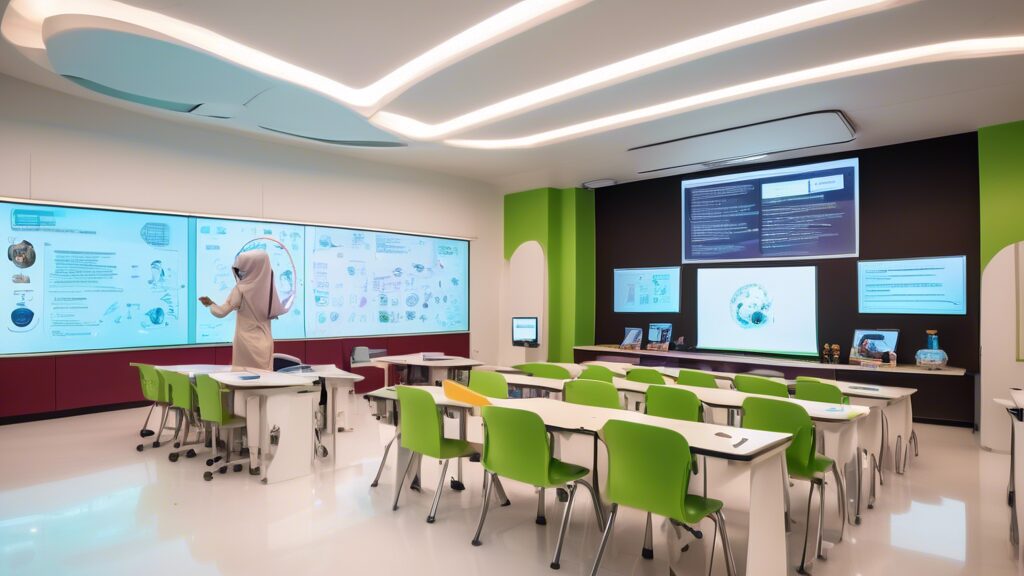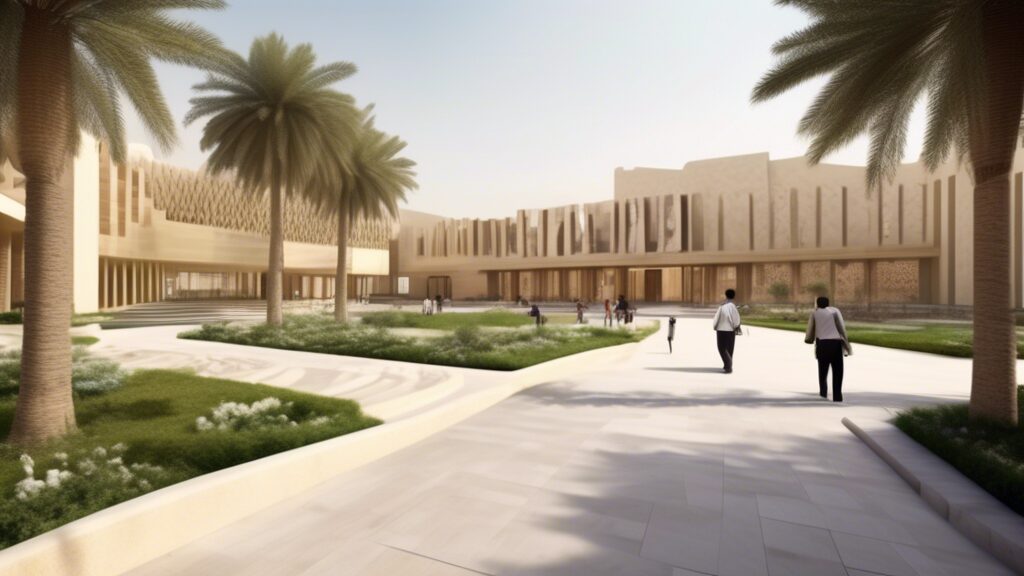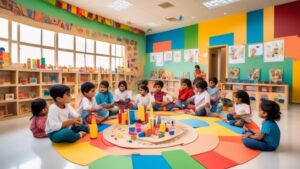Understanding the education facility regulations in Qatar is crucial for anyone involved in the country’s education sector. These regulations, mandated by the Ministry of Education and Higher Education, set the standard for what is required to maintain quality education and ensure safe learning environments for students. At the core, education facility regulations in Qatar encompass fundamentals such as infrastructure standards, safety protocols, and environmental considerations, all designed to foster a conducive learning atmosphere.
The importance of these regulations lies in their role in upholding a consistent quality of education across all institutions. By setting clear requirements, the Ministry helps ensure that all educational facilities are equipped to provide a safe, healthy, and engaging space for learning. These standards are not only about physical facilities but also about creating an environment that supports effective teaching and learning processes.
For educational institutions, compliance with these regulations is non-negotiable. Schools and universities must undertake a series of steps to align with the mandated guidelines. This involves regular reviews and updates of their facilities, adhering to safety standards, and implementing best practices as recommended by the authorities. Successful compliance is evident in many of Qatar’s educational institutions, where adherence to these standards has not only improved infrastructure but also enhanced overall educational outcomes. Institutions that meet these regulations often serve as benchmarks within the region, demonstrating the benefits of a well-regulated educational environment.
In conclusion, education facility regulations in Qatar play a significant role in shaping the educational landscape, ensuring that students and educators alike benefit from high-quality, safe learning spaces. Understanding and adhering to these regulations is vital for all educational stakeholders, as it directly contributes to the broader goal of educational excellence in Qatar.
Overview of Education Facility Regulations in Qatar
Education in Qatar is governed by comprehensive regulations that ensure quality educational experiences for all students. The education facility regulations Qatar embraces are primarily established by the Ministry of Education and Higher Education. These regulations encompass various aspects from infrastructure standards to safety protocols, aiming to promote a conducive learning environment.
Key Requirements Set by the Ministry of Education and Higher Education
The regulations set forth by the Qatar Ministry of Education and Higher Education are extensive and cover several critical areas:
- Infrastructure and Design: Educational facilities must adhere to stringent infrastructure guidelines. These include specifications for classroom size, lighting, ventilation, and accessibility to ensure that the physical environment supports learning and teaching.
- Safety Standards: Safety is paramount. Schools are required to have well-defined emergency procedures, fire safety systems, and security measures in place. Regular safety drills and inspections are part of the regulatory compliance.
- Health and Hygiene: Facilities need to maintain high standards of cleanliness and hygiene. This includes providing adequate sanitation facilities, ensuring clean drinking water, and promoting health awareness among students and staff.
- Technology Integration: Schools are encouraged to incorporate technology in their educational methodologies. The regulations support the adoption of modern teaching tools and digital resources that enhance learning experiences.
- Teacher Qualifications: To ensure quality education, the regulations specify qualifications and training standards for educators. Continuous professional development for teachers is also emphasized to keep the teaching methods modern and effective.
Importance of Education Facility Regulations
The education facility regulations Qatar imposes are essential for several reasons:
- Maintaining Quality Education: These regulations set a benchmark for quality, ensuring that all educational institutions provide a standard level of education. By requiring qualified teachers, appropriate curricula, and sufficient resources, students receive comprehensive and robust educational experiences.
- Ensuring Safe Learning Environments: Regulations play a significant role in creating safe environments for students and staff. By mandating safety measures and emergency preparedness, these rules protect the well-being of all occupants and help prevent accidents and incidents.
- Promoting Equal Opportunities: By standardizing educational environments, these regulations ensure that all students have access to the same level of care and education, irrespective of their background or the institution they attend.
- Encouraging Innovation and Development: The emphasis on technology and continuous teacher development encourages schools to innovate, adopt new teaching practices, and stay updated with global educational trends, thus fostering an environment of learning and growth.
Significance of Education Facility Regulations
Education Facility Regulations in Qatar are not just rules; they shape the future of education in the country.
- Standardization: By setting high and uniform standards, the regulations help maintain consistency across educational institutions, ensuring all students benefit from a high-quality educational experience.
- Global Competitiveness: Adhering to these regulations helps Qatari educational institutions compete globally. By maintaining top-notch educational standards, students in Qatar are better prepared to participate in global academic and professional arenas.
In essence, the education facility regulations Qatar has adopted are pivotal in nurturing a well-rounded, secure, and progressive education system. By understanding and implementing these regulations, educational facilities not only comply with national standards but also contribute positively to the broader goal of advancing the nation’s educational framework.
Looking to Start an Educational Institution in Qatar? Contact Us!

Compliance and Implementation of Regulations in Qatar’s Education Sector
Steps for Compliance with Education Facility Regulations in Qatar
Complying with education facility regulations in Qatar is essential for maintaining a high standard of education and ensuring the safety of students and staff. Educational institutions in Qatar are required to follow a series of steps to meet these standards:
1. **Understand the Regulations**: Educational institutions must begin by thoroughly understanding the specific education facility regulations Qatar enforces. This includes familiarizing themselves with documents and guidelines provided by the Ministry of Education and Higher Education.
2. **Conduct a Regulatory Assessment**: Schools and universities should conduct an initial assessment to identify how existing facilities and practices align with the mandated regulations. This step helps in determining areas that require adjustments or improvements.
3. **Develop a Compliance Plan**: Based on the assessment, institutions should create a detailed compliance plan. This plan outlines the steps that need to be taken to meet regulatory requirements, including timelines and responsible parties.
4. **Staff Training and Awareness**: Ensuring that all staff members are aware of the regulations and the institution’s compliance plan is crucial. Regular training sessions should be conducted to keep everyone informed about the latest standards and practices.
5. **Implement Necessary Changes**: Schools and universities must make necessary changes to facilities and processes. This may include renovating buildings for safety, updating equipment, or enhancing emergency preparedness protocols.
6. **Regular Monitoring and Evaluation**: Continuous monitoring of compliance efforts is vital. Institutions should regularly evaluate their practices and facilities to ensure ongoing adherence to regulations, making adjustments as needed.
7. **Engage with Authorities**: Maintaining open communication with the Ministry of Education and Higher Education is important for staying updated on any changes in regulations or requirements. Institutions should not hesitate to seek guidance when needed.
8. **Document and Report Compliance**: Keeping detailed records of compliance efforts is essential. Schools and universities should document all changes made and any correspondence with regulatory bodies. Periodic reports may be required by the Ministry to demonstrate compliance status.
Examples of Successful Compliance in Qatar
Many educational institutions in Qatar have successfully adapted to meet the stringent education facility regulations Qatar mandates. These examples serve as models for others striving to achieve similar success:
– **International School Collaboration**: An international school in Doha partnered with a consultancy specializing in educational compliance. By utilizing their expertise, the school was able to align its facilities and curriculum with Qatar’s regulations efficiently, resulting in a seamless inspection process and high satisfaction among parents and students.
– **University Campus Overhaul**: A renowned university in Qatar undertook a comprehensive campus overhaul focused on safety and sustainability. By investing in state-of-the-art safety systems, energy-efficient buildings, and accessible facilities, the university not only met the regulatory requirements but also enhanced the overall student experience.
– **Community Engagement Programs**: Some schools have implemented community engagement programs that involve parents and local leaders in the compliance process. These programs ensure transparency and build trust, leading to a more supportive and collaborative environment for regulatory fulfillment.
Benefits of Compliance for Educational Institutions
There are several advantages for educational institutions that comply with education facility regulations Qatar enforces:
– **Enhanced Safety and Security**: Compliance ensures that educational facilities are safe and secure, protecting students and staff and reducing the likelihood of accidents or emergencies.
– **Improved Educational Quality**: By meeting all regulatory standards, institutions can provide a higher quality education, attracting more students and gaining a positive reputation.
– **Increased Credibility and Trust**: Successfully complying with regulations boosts the institution’s credibility among parents, students, and the community, as it demonstrates a commitment to adhering to high standards.
– **Eligibility for Government Support**: Institutions that consistently meet regulatory standards may become eligible for government funding or support, allowing them to further improve their facilities and offerings.
– **Attracting International Partnerships**: Compliance with local regulations can pave the way for partnerships with international educational bodies, enhancing the institution’s status and providing greater opportunities for students and faculty.
By following a structured approach to compliance and learning from successful examples, educational institutions in Qatar can meet the necessary regulations effectively, ensuring a safe, high-quality educational environment for all.
In conclusion, understanding and complying with education facility regulations in Qatar is essential for maintaining high standards of educational quality and creating safe, conducive learning environments. These regulations, mandated by the Ministry of Education and Higher Education, cover various aspects, from infrastructure and safety measures to curriculum standards and staff qualifications. By setting these requirements, Qatar ensures that educational institutions provide students with optimal conditions for learning and development.
Compliance with these regulations involves a structured approach. Educational institutions in Qatar must undertake a series of steps including thorough facility assessments, infrastructure upgrades as needed, and regular audits to ensure ongoing adherence to the standards. Successful compliance is exemplified by institutions that have not only met but exceeded these standards, thereby enhancing their educational offerings and reputation. For example, some schools and universities have implemented green building practices and cutting-edge technology, setting a benchmark for others to follow.
The significance of these regulations cannot be overstated, as they play a crucial role in safeguarding students’ welfare and ensuring that the educational goals of the nation are met. A well-regulated educational environment contributes positively to student outcomes, preparing them for future academic and career challenges. By upholding these regulations, educational facilities ensure a reliable and consistent quality of education, which is instrumental in fostering a knowledgeable, skilled, and capable future workforce.
For students, parents, and educators, adherence to these regulations offers peace of mind, ensuring that education is delivered in a secure, well-maintained setting. Overall, the effective implementation of education facility regulations enriches the educational landscape of Qatar, providing a strong foundation for academic excellence and continual improvement in the education sector.
Looking to Start an Educational Institution in Qatar? Contact Us!






